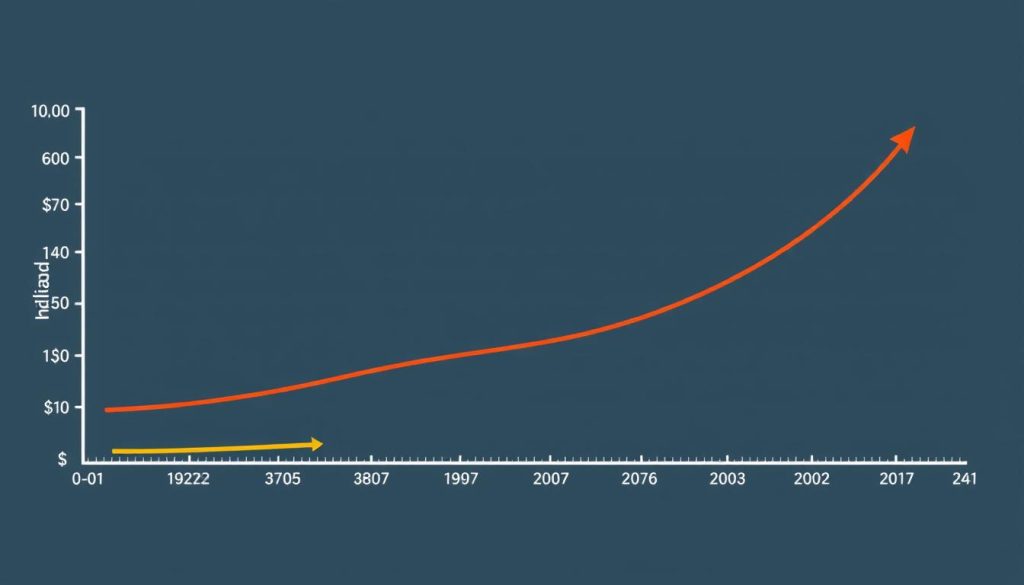The healthcare system in Ireland includes a wide range of services. You can choose from public hospitals to high-end private ones. But understanding the costs of private healthcare can be tricky. These costs can greatly affect people looking for treatment outside of public options.
- The Rising Costs of Private Healthcare in Ireland
- Comparing Public and Private Healthcare Systems in Ireland
- Why Healthcare Expenses Can Be Higher in Private Systems
- Specialist Care Costs in Private Healthcare
- The Role of Insurance in Private Healthcare Costs
- The Economic Impact of Private Healthcare Inflation
- Government Regulations and Private Healthcare Pricing
- Out-of-Pocket Expenses in Private Healthcare
- Benefits and Drawbacks of Private Healthcare
- The Future of Private Healthcare in Ireland
- Cost Comparison of Common Procedures
- The Influence of Technological Advancements on Costs
- FAQ
This part gives a basic overview of these financial issues. We look into reports from the Health Insurance Authority of Ireland, the Central Statistics Office of Ireland, and the Irish Medical Organisation. With private healthcare costs going up, people are facing many financial worries.
Key Takeaways
- The Ireland healthcare system offers both public and private medical services.
- Private medical expenses can significantly impact a patient’s financial situation.
- Key sources provide essential insights into the costs associated with private healthcare.
- Understanding the financial burden is crucial for those opting for private treatment.
- This introductory section sets the stage for a detailed exploration of private healthcare costs in Ireland.
The Rising Costs of Private Healthcare in Ireland
The costs of Ireland’s private healthcare are rising quickly. This issue worries both people who need care and those who make policies. It’s important to look at why costs are going up and its effects. Let’s explore what’s causing these increases and the effect of more people wanting private healthcare.
Factors Leading to Higher Private Healthcare Costs
Many reasons make private healthcare costs in Ireland go up. One main reason is medical inflation, which means costs for medical services and goods are increasing. Another big factor is new medical technology. These new tools and treatments can be very expensive, which makes healthcare costs go higher. Also, the price of medical supplies is going up, partly because it’s harder to get them from around the world.
The Impact of Increased Demand on Prices
More people wanting private healthcare affects how much it costs. People choose private care to skip the long waits in public healthcare. This makes private care more expensive due to higher demand. The Irish Hospital Consultants Association says that more patients are making resources stretched. This raises fees. Reports on the Private Healthcare Market say that more users make the market competitive, which pushes prices up.
| Year | Average Cost Increase | Primary Cost Driver |
|---|---|---|
| 2018 | 5% | Medical Inflation |
| 2019 | 6% | Increased Demand |
| 2020 | 7% | Cost of Medical Supplies |
It’s key to understand how rising healthcare costs and more demand for private care are linked. The Department of Health’s stats show these trends might continue. This means we need good plans to handle and reduce costs.
Comparing Public and Private Healthcare Systems in Ireland
In Ireland, the healthcare sector is divided into public and private systems, each with its own set of services, costs, and efficiency levels. By comparing these systems, we can see the key differences. It helps people understand which system may be better for their needs.
Services Offered by Public Versus Private Facilities
The public healthcare system, managed by Ireland’s Health Service Executive (HSE), offers a wide range of services. It aims to provide essential healthcare to all. Yet, it faces challenges like long waiting times and limited resources.
Private healthcare, however, gives a personalized care experience with quicker access to specialists and procedures. The care quality is often higher, but this comes with a higher cost.
Cost Differences Between Public and Private Healthcare
Public and private healthcare in Ireland differ greatly in costs. Public services are often free or subsidised, funded mostly by taxes. This approach makes various treatments affordable for many people.
In the private sector, costs are much higher, covered by insurance or out-of-pocket payments. The National Treatment Purchase Fund (NTPF) notes that while private care offers immediate access, it can financially strain many individuals.
Here’s a detailed healthcare services comparison table illustrating the cost disparities:
| Aspect | Public Healthcare | Private Healthcare |
|---|---|---|
| Funding Source | Taxation | Private Insurance/Out-of-Pocket |
| Wait Times | Longer | Shorter |
| Service Access | Broad/Universal | Selective |
| Quality of Care | Variable | Generally Higher |
| Cost to Patients | Low/Moderate | High |
| Specialist Availability | Limited | Expansive |
Understanding these differences in the Irish healthcare system is key. It helps people decide which healthcare path, public or private, fits their needs and financial capabilities.
Why Healthcare Expenses Can Be Higher in Private Systems
Private healthcare systems often have higher costs. This is mainly because they offer unique services and top-notch facilities for a better patient experience. These services aim to please those who want the best care, privacy, and comfort, which increases the price.
These exclusive services include the connection between their uniqueness and the reasons for their high prices.
Exclusive Services and Premium Facilities
Private hospitals provide premium healthcare with advanced diagnostics and modern equipment. They also offer luxury stays. Patient comfort is a top priority, with private rooms and fancy meals. Personal medical plans are also available.
The Private Hospital Associations say these services are for those wanting fast, efficient, and customised healthcare.
Shorter Waiting Times and Personalised Care
Private healthcare is known for its short wait times. This quick service boosts patient happiness but also raises operating costs. These costs then affect the prices for patients.
Every patient gets a tailored healthcare plan to meet their needs. This custom approach means using more resources, which makes private care more expensive.
Patient stories often talk about quick recovery and better care in private healthcare. Research and articles also show that top-quality facilities lead to higher costs in private healthcare systems.
Specialist Care Costs in Private Healthcare
Private healthcare in Ireland is costly, especially for specialist medical care. Quick access to advanced procedures and tests increases the price. These facilities offer a wide range of diagnostic tests but at a high cost.
Access to Specialist Doctors
In the private sector, seeing specialist doctors can cost a lot. Unlike the public system with its long waits, private care gets you quicker appointments. This fast access to specialists adds to the private healthcare’s high costs.
Procedures and Diagnostic Tests
Private healthcare means easier access to advanced procedures and modern tests. Yet, this comes with high financial costs. Things like MRI scans and specialised surgeries are expensive but available faster than in public facilities.
Here’s a look at how much you might pay for specialist services in private versus public healthcare:
| Service | Private Healthcare Cost | Public Healthcare Cost |
|---|---|---|
| Specialist Consultation | €200 – €300 | €0 – €100 |
| MRI Scan | €400 – €600 | €200 – €400 |
| Blood Tests | €100 – €150 | €20 – €50 |
The Role of Insurance in Private Healthcare Costs
Insurance schemes deeply affect private healthcare costs in Ireland. To understand this impact, we need to look at how premiums are calculated. Factors like age, health status, and desired coverage influence these costs.
In Ireland, health insurance needs strict rules for fair pricing. Premiums vary based on different factors. This includes a person’s age, their health, and the coverage they seek.
Premiums are key in making private healthcare affordable. Looking at reports and surveys shows how costs change. Insurers and customers aim to balance good coverage with reasonable costs.
Insurance also affects the quality of care. Having private insurance means better services and procedures are available. This shows the value of a well-managed insurance system for private healthcare.
Understanding the link between insurance costs and healthcare is complex. It requires ongoing checks and policy updates. This helps meet the changing health needs of people. It aims to lower costs for individuals while improving health care quality.
The Economic Impact of Private Healthcare Inflation
The rise in private healthcare costs is a big problem. It affects families and how countries use their money. Knowing how it changes the way people spend on health is key to understanding its wider effects.
Effect on Household Budgets
Private healthcare getting more expensive puts pressure on families. People spend more of their money on health care now. This means less money for things like school, homes, and saving.
A report shows spending on health by families is up because of these higher costs.
Healthcare Spending Trends in Ireland
In Ireland, this trend shows in how the government and people spend on health. Even though private healthcare is pricier, its perks like less waiting and better care attract people. Surveys show richer families tend to spend more on private health, creating a divide in access to care.
| Year | Average Household Healthcare Spending (€) | Private Healthcare Inflation Rate (%) |
|---|---|---|
| 2018 | 2,500 | 3.2 |
| 2019 | 2,650 | 3.8 |
| 2020 | 2,800 | 4.1 |
| 2021 | 3,000 | 4.5 |
This table shows healthcare costs for families going up with inflation. These figures prove the issue affects more than just personal budgets. It shapes big economic decisions and what we see as important.
Government Regulations and Private Healthcare Pricing
The role of government in private healthcare pricing is big. In places like the UK, laws have been made to keep healthcare costs fair and manageable. They set price limits and make sure costs are clear to people.
Price Control Measures
Caps on prices for healthcare services help control costs. This means that things like medical tests and surgeries won’t become too expensive. Health departments have rules to stop prices from getting too high, for example:
| Service | Regulated Price Cap | Market Price |
|---|---|---|
| Consultation | £150 | £200 |
| Diagnostic Tests | £100 | £130 |
| Surgical Procedures | £1,500 | £2,000 |
This pricing control makes planning for healthcare costs easier. Still, finding the right balance is hard. Providers often worry about how these limits affect their business.
Transparency in Billing
Clear billing is essential. It gives patients a detailed look at their charges. Laws demand providers to give itemised bills. Eliminating hidden fees and surprises is the goal. The Care Quality Commission checks to make sure rules are followed.
Still, understanding medical bills can be tough for some. More needs to be done to make things simpler and teach patients about costs. Making billing clearer is key to building trust with those who use healthcare services.
Out-of-Pocket Expenses in Private Healthcare
Private healthcare can be a heavy financial load. This is true when facing out-of-pocket costs. Even those with full insurance might have to pay a lot for treatments not covered. It’s key to know about these costs to handle your healthcare budget.
Uncovered Treatments and Surgeries
Not all treatments and surgeries are covered by insurance. This leaves many facing high expenses. Even with insurance, you might need to pay a lot for procedures considered non-essential. This includes elective surgeries or special treatments.
Studies show that many don’t fully understand how much they’ll pay for uninsured treatments. It’s vital to check your insurance carefully. Know what’s covered and what could cost extra.
Costs of Medication and Follow-Up Care
Medicine can also lead to high out-of-pocket costs. Even insured people may face big copays, especially for chronic conditions. Plus, advanced drugs often aren’t fully covered and can be very expensive.
Follow-up care adds more costs. Regular check-ups and ongoing treatment after surgery can be costly without good coverage. Planning for these expenses is important.
Below is a comparison of typical costs in private healthcare:
| Treatment Aspect | Estimated Out-of-Pocket Costs |
|---|---|
| Elective Surgeries | £3,000 – £10,000 |
| Specialised Medications | £200 – £1,000 per month |
| Follow-Up Care | £50 – £300 per visit |
Being aware of potential costs is crucial. This helps patients and families avoid surprise bills. As healthcare changes, having this knowledge can help in making smarter financial choices.
Benefits and Drawbacks of Private Healthcare
Private healthcare has many upsides compared to public healthcare. One main advantage is the high-quality services it offers. Patients get access to the latest medical tech and facilities. This leads to better diagnosis and treatment.
Private healthcare usually means shorter wait times. This is crucial for those needing urgent care. Plus, the personalised care in the private sector makes the patient’s experience better.
Yet, private healthcare has its downsides. The biggest issue is that it’s often too expensive. This means not everyone can afford it, creating inequality in healthcare access.
Also, private healthcare can sometimes have unclear billing. The costs can vary a lot. This might lead to unexpected bills for patients.
It’s crucial to think about its effect on society too. When private healthcare grows, it can weaken the public health system. This could mean less quality public health services due to fewer resources.
| Aspect | Advantages | Drawbacks |
|---|---|---|
| Service Quality | Advanced technology and facilities | Not uniformly accessible |
| Accessibility | Shorter waiting times | High costs |
| Patient Care | Personalised attention | Complex billing |
| Socio-Economic Impact | Enhanced service for those who can afford it | Can strain public healthcare resources |
Health reviews and advocacy groups keep focusing on these issues. They push for reforms to make private healthcare more balanced. Through ongoing evaluation and smart decision-making, we can aim for a fairer healthcare system.
The Future of Private Healthcare in Ireland
The future of healthcare in Ireland’s private sector looks set for big changes. This is due to new trends and possible healthcare reforms. The way healthcare is given and reached is changing and everyone is watching closely.
Emerging Trends in Healthcare Services
There’s a move towards care that puts the patient first, using new tech like telemedicine and AI for diagnosing. These advances aim to improve patient care and make healthcare work better. Also, there’s a growing demand for care that meets the unique needs of each patient, leading to a more whole-person approach.
Potential Reforms and Changes
Reforms in healthcare might make private care more affordable and easier to access. Papers on policy suggest that new laws could make costs clearer and help control prices. Also, the economy and how healthcare is funded will greatly affect healthcare costs and how services are provided in the future.
The table below shows what might change with the new reforms:
| Aspect | Current Scenario | Future Projections |
|---|---|---|
| Service Delivery | Fragmented | Integrated and Patient-Centric |
| Cost Transparency | Limited | Enhanced |
| Technological Integration | Moderate | High |
| Policy Impact | Minimal | Substantial |
As these trends and reforms come about, Ireland’s healthcare is set to change a lot, for the better of both patients and providers. With good planning and smart policymaking, the healthcare industry can handle these changes well. This will make sure the system stays strong and up-to-date.
Cost Comparison of Common Procedures
The costs of surgical and medical procedures differ greatly in Ireland’s private and public healthcare. It’s vital for patients to understand these costs to choose wisely.
Surgical Procedures
The price of surgery can vary a lot based on the procedure and the hospital. For instance, a simple appendectomy costs €3,000 to €4,500 in private hospitals. Yet, in public hospitals, it might cost much less or nothing at all, thanks to national health services.
Hip replacements are another example. They cost between €12,000 and €15,000 in private hospitals. But in public hospitals, the cost is much lower.
Medical Treatments
The cost of medical treatments also varies widely. Chemotherapy, for example, can be over €2,000 a session in private clinics. In public healthcare, though, the cost is often small or helped by government funds.
Diagnostic tests like MRIs have a similar trend. They are pricier in private clinics, costing €300 to €700. Public healthcare usually charges a small fee or it’s covered by insurance.
The Influence of Technological Advancements on Costs
Using new medical treatments and digital tools is changing the cost of private healthcare. Technology affects costs in different ways. High-tech equipment and advanced treatments are expensive at first due to their innovation.
But, these new methods can save money over time. They make things more efficient, reduce mistakes, and are less harsh. Healthcare providers are bringing in new tech like AI for diagnosis and services for remote care. The start-up costs are high, but the benefits are huge.
For example, AI can quickly spot diseases, leading to cheaper, earlier treatment. Telehealth cuts costs by offering remote check-ups, making healthcare cheaper and more convenient. Studies show that some new techs become cost-effective as time goes on. Robots in surgery, while pricey, improve accuracy and speed up recovery.
This cuts down on hospital stays and related costs. Despite the upfront costs, new healthcare tech can be economically beneficial in the long run. Analysing these costs and benefits is key to deciding on new technologies for medical centres.
As healthcare embraces technology, the balance between spending and saving evolves. The first investment in medical tech and software is big. However, wise planning can lessen these costs. As the industry moves towards more digital solutions, checking these costs is vital.
It ensures that the upgrades in patient care and efficiency are worth the investment. This helps create a healthcare system that can last.




















